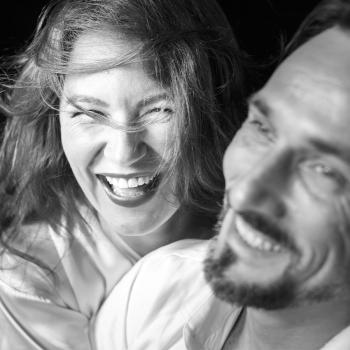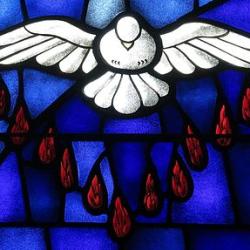There are several Druidic traditions that have been around for a while and delve into the myths and practices of the ancient Celts. Where does Celtic Reconstructionism merge and diverge from those traditions?
When we're talking about groups like the Order of Bards, Ovates, and Druids (OBOD), there's really not much overlap or commonality at all in terms of theology or practice. OBOD and some of the other older druid groups come out of the magical lodge tradition and have more to do with groups like the Masons or the Odd Fellows than they do with Celtic spirituality. It's a long and valuable tradition, but it doesn't really have anything to do with what CR does. I know that some OBOD material has incorporated more actual Celtic sources into it in the last decade or so, but they're very clear that what they're doing is in the western magical current, and that OBOD is a philosophy rather than a religion per se.
Groups like Ár nDraíocht Féin: A Druid Fellowship (ADF) are certainly much closer to CR in terms of methodology and some aspects of theology, though I've always rather twitched when ADF refers to groups within its organization that practice with Greek or Norse or Lithuanian deities as "druids." To me, that's a complete non sequitur and I've had to just say, "Okay, they mean ADF druids, not druids in the original cultural sense" and back away slowly. They do emphasize research and scholarship, and we certainly have that in common. Their cosmology is more similar to what CRs are generally doing than is the cosmology of Wicca. I have some great friends and colleagues who are ADF members and whom I respect very much, even though we're not doing the same things.
Last year I went to ADF's regional Eight Winds festival and had a fantastic time; I'll be going back again this summer and one of the things I'll be doing there as part of the workshops program is having an open dialogue with Skip Ellison, who wrote a book on tree ogam, to discuss our differing perspectives. That should be a great conversation and it's one we're both looking forward to. Eight Winds runs over the summer solstice weekend and this year, 2010, it's in Washington state -- last year's was in northern California -- so I'll be driving down to see everyone again.
Overall, CR focuses primarily on Celtic cultures and deities, and looks to what we can know about what was done historically in building our practice. Our ritual formats are usually quite different than either the OBOD style groups or than ADF's ritual framework.
At PantheaCon you spoke about the need for rituals to honor the leaving and returning of our soldiers. That seems like such an ancient thing, yet I hadn't encountered talk of it among modern Pagans before. Is this something Pagan military chaplains are active in, or is this something you feel is lacking in Pagan ritual on military bases?
First, there are no Pagan chaplains in the U.S. military at all that I'm aware of. There are Pagan lay leaders and there are, I believe, some enlisted chaplaincy assistants who are Pagan, but the chaplaincy itself is a particular designation within the military officers ranks and the vast majority of military chaplains are from fairly conservative Protestant Christian denominations. Issues regarding Pagans in the military are becoming more visible, primarily because there are more out Pagans serving these days than there were twenty or thirty years ago. It can be difficult and sometimes even dangerous to be an out Pagan in the military, even now.
When it comes to ritual for deploying or returning Pagan military personnel, these things are being dealt with in local communities if they're being touched on at all, and that's pretty rare. There are a few resources out there for military Pagans, but it's still very thin on the ground. Most of what I've seen happening tends to be in Reconstructionist Pagan communities, because we're the traditions with a strong warrior current, if you will. A lot of Wicca and other more general modern Paganism tends to regard "warrior" as more of a spiritual than a physical role, or to reject the idea altogether.
The local CR group's warrior rituals sprang from the fact that one of our people was being deployed to Iraq and had requested a ritual before he left. We had to do a lot of hard thinking about what we were going to do before we came up with that ritual. The return ritual arose under similar circumstances, though I was the person who was the recipient of that first return ritual, almost thirty years after I'd been discharged. It's very powerful stuff, going through a vigil like that as a reintegration to the civilian community, and there's far too much to say about all of it for an interview like this. All I can say in brief is that I found it a very profound experience and that it has a very deep influence upon my life.
I think one thing that needs to be said is that not all people in military service are "soldiers" -- neither the Air Force nor the Navy designate their people that way; we're airmen and sailors, not soldiers, and that doesn't mean that people in those branches never see combat. Another thing that I think is very important is that combat veterans are not the only ones who need these rituals. Just because we're not being shot at by an enemy doesn't mean we aren't dealing with serious issues of our own. From military sexual trauma to the stresses of dealing with the possibility of having to fire nuclear weapons on a daily basis, there are a lot of things going on in the military that service members need to be able to process when they're discharged or when they return from deployment. Some of us have always been military -- I was born in a Navy hospital and have been associated with the military, whether I've wanted to be or not, for my entire life. That kind of family and personal history leaves a very deep mark, because military culture is very different than civilian culture on so many levels.




